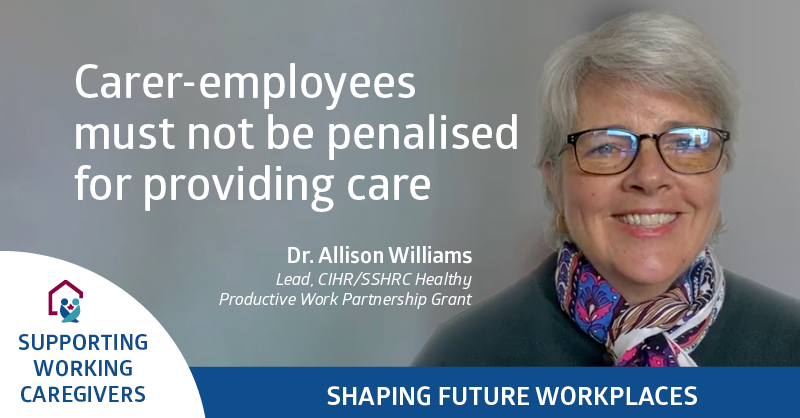Availability of caregiver‐friendly workplace policies (CFWPs): an international scoping review
This comparative nation-state study of Carer-Friendly Workplace Policies (CFWPs) provides the baseline data to allow the scale-up of the Carer-inclusive Standard for global uptake.
A scoping methods approach, as outlined by Arksey and O’Malley[i], was used to provide the first synthesis of the literature with respect to the availability of Carer-Friendly Workplace Policies (CFWPs) internationally. Searches were performed in both the academic and grey literature, published between 1994 and 2014. A total of 701 articles were found. Seventy (n = 70) articles met all inclusion criteria and were included in this review. Of the 70 articles, the names and associated CFWPs of 88 unique workplaces were identified. Four main qualitative themes were identified.
Theme 1, Diversity, and Inclusiveness included defining ‘carer-employees’ (CEs); considering the employee’s position within the organization; looking at the gender norms around caregiving; and considering ethnic diversity and caregiving.
Theme 2, Motivation recognized the business case for implementing CFWPs, the influence of demography on the paid labour market; and employers’ sense of social responsibility to support their CEs.
Theme 3, Accessibility identified barriers to accessibility of CFWPs including stigma, the level of employee confidence in their employer’s ability to accommodate their needs, and the merits of formal mandated policies or case-by-case solutions.
Theme 4, Workplace Culture looked at the relationship to policies that offer CEs work-life balance and the extent to which CFWPs are embedded within the organizational structure or within HR policies.
The observations and examples provided in the paper provide numerous interesting insights into how countries and employers have approached the concept of working-carers. Eight recommendations for employers and government to consider to better support CEs are provided.
Given the ageing global demographics, the issue of integrating paid work with unpaid family caregiving will continue to be a serious concern for employers and the economy in Canada and internationally. Carer-employees must not be penalised for providing care by losing their jobs. Both men and women must be given equal opportunities to balance good quality work with their care‐giving responsibilities.[ii] Due to demographic changes, caregivers will continue to be employed in paid labour in later stages of their lives[iii], thus government and employer policies must reflect strategies to support carer-employees in their caregiving responsibilities while engaging in paid work.
Continued uptake of CFWPs is necessary to create workplace accommodations that foster work–family balance for carer employees while assisting employers to retain talented and skilled workforce.
Read the full published article
References
[i] Arksey H. & O’Malley L. (2005) Scoping Studies: towards a methodological framework. International journal of social research methodology 8 (1), 19–32. [Google Scholar]
[ii] ETUC (2011) Working Time, Gender Equality, and Reconciling Work. European Trade Union Confederation, Brussels: Available at: https://www.etuc.org/sites/default/files/A_TT_egalite_u_sexes_EN_1.pdf (accessed on 03/01/2022).
[iii] Ibid
ABOUT THE PROJECT
Carers Canada is leading the knowledge mobilization activities for a multi-sectorial research program to spread and scale a carer-friendly workplace standard, known as the ‘Carer-Inclusive and Accommodating Organizations’ Standard (CSAB701-17). Led by Dr. Allison Williams, CIHR Research Chair in Gender, Work and Health at McMaster University, the research program consists of six inter-related sub-projects that will: increase awareness of the standard across Canada; evaluate readiness to change; determine feasibility and cost benefit; embrace cultural competency; consider Indigenous perspectives; and create an international standard. Learn more

CIHR/SSHRC Healthy Productive Work Partnership Grant “Scaling up the Career Inclusive Accommodating Organizations Standard” FRN: HWP-146001 (CIHR); 890-2016-3018 (SSHRC).
 Allison WilliamsJanuary 24, 2022
Allison WilliamsJanuary 24, 2022

Availability of caregiver‐friendly workplace policies (CFWPs): an international scoping review
This comparative nation-state study of Carer-Friendly Workplace Policies (CFWPs) provides the baseline data to allow the scale-up of the Carer-inclusive Standard for global uptake.
A scoping methods approach, as outlined by Arksey and O’Malley[i], was used to provide the first synthesis of the literature with respect to the availability of Carer-Friendly Workplace Policies (CFWPs) internationally. Searches were performed in both the academic and grey literature, published between 1994 and 2014. A total of 701 articles were found. Seventy (n = 70) articles met all inclusion criteria and were included in this review. Of the 70 articles, the names and associated CFWPs of 88 unique workplaces were identified. Four main qualitative themes were identified.
Theme 1, Diversity, and Inclusiveness included defining ‘carer-employees’ (CEs); considering the employee’s position within the organization; looking at the gender norms around caregiving; and considering ethnic diversity and caregiving.
Theme 2, Motivation recognized the business case for implementing CFWPs, the influence of demography on the paid labour market; and employers’ sense of social responsibility to support their CEs.
Theme 3, Accessibility identified barriers to accessibility of CFWPs including stigma, the level of employee confidence in their employer’s ability to accommodate their needs, and the merits of formal mandated policies or case-by-case solutions.
Theme 4, Workplace Culture looked at the relationship to policies that offer CEs work-life balance and the extent to which CFWPs are embedded within the organizational structure or within HR policies.
The observations and examples provided in the paper provide numerous interesting insights into how countries and employers have approached the concept of working-carers. Eight recommendations for employers and government to consider to better support CEs are provided.
Given the ageing global demographics, the issue of integrating paid work with unpaid family caregiving will continue to be a serious concern for employers and the economy in Canada and internationally. Carer-employees must not be penalised for providing care by losing their jobs. Both men and women must be given equal opportunities to balance good quality work with their care‐giving responsibilities.[ii] Due to demographic changes, caregivers will continue to be employed in paid labour in later stages of their lives[iii], thus government and employer policies must reflect strategies to support carer-employees in their caregiving responsibilities while engaging in paid work.
Continued uptake of CFWPs is necessary to create workplace accommodations that foster work–family balance for carer employees while assisting employers to retain talented and skilled workforce.
Read the full published article
References
[i] Arksey H. & O’Malley L. (2005) Scoping Studies: towards a methodological framework. International journal of social research methodology 8 (1), 19–32. [Google Scholar]
[ii] ETUC (2011) Working Time, Gender Equality, and Reconciling Work. European Trade Union Confederation, Brussels: Available at: https://www.etuc.org/sites/default/files/A_TT_egalite_u_sexes_EN_1.pdf (accessed on 03/01/2022).
[iii] Ibid
Allison Williams completed her PHD at York University (Toronto, Canada) and, after holding permanent positions at both Brock University (St. Catharines, Ontario) and University of Saskatchewan (Saskatoon, Saskatchewan), is now a Professor in McMaster University’s School of Earth, Environment & Society (Hamilton, Ontario). Her background in social health and geography continue to inform policy development. Dr. Williams has held three Canadian Institutes of Health Research (CIHR) Research Chairs, the latest of which is the CIHR Institute of Gender and Health Chair in Gender, Work and Health. She teaches health geography, public health and research methods.
FAVORITE PASTIME: Being outdoors! Hiking & cycling in summer, and alpine & cross-country skiing in winter
Email – awill@mcmaster.ca
Website – https://ghw.mcmaster.ca
ABOUT THE PROJECT
Carers Canada is leading the knowledge mobilization activities for a multi-sectorial research program to spread and scale a carer-friendly workplace standard, known as the ‘Carer-Inclusive and Accommodating Organizations’ Standard (CSAB701-17). Led by Dr. Allison Williams, CIHR Research Chair in Gender, Work and Health at McMaster University, the research program consists of six inter-related sub-projects that will: increase awareness of the standard across Canada; evaluate readiness to change; determine feasibility and cost benefit; embrace cultural competency; consider Indigenous perspectives; and create an international standard. Learn more

CIHR/SSHRC Healthy Productive Work Partnership Grant “Scaling up the Career Inclusive Accommodating Organizations Standard” FRN: HWP-146001 (CIHR); 890-2016-3018 (SSHRC).